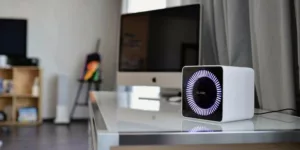Smart home devices are becoming more popular and more integrated, helping you with everything from playing music throughout your house to improving your home security. The more devices you add to this network, controllable from your smartphone or tablet, the more you feel like you’re living in the future.
But before you go off chasing that next must-have smart device, take a moment to consider the important security concerns that may rise with that purchase.
Security Concerns
IoT and smart devices may not inherently make your life more secure. Consider these important points:
1. Smart devices don’t protect against every threat.
A new smart lock or video doorbell can help you secure your home against possible intruders—but they might also lull you into a false sense of security if you aren’t careful. For example, in 35 percent of burglaries, the intruder simply entered through an unlocked door or window to gain entry to the home. If you install a new security device and believe it’s going to be an effective (and total) deterrent for crime, you may get careless about simple steps like locking your upstairs windows when you leave the house. No matter what, you still need to be attentive if you want your home to be secure.
2. Every device adds new points of vulnerability.
Every new device you add to your life is another potential target for hackers—and hackers are increasingly targeting home-based smart devices because of how practical they are in things like distributed denial of service (DDoS) attacks. Each device carries its own signature blend of vulnerabilities, ranging from backdoor points of entry to your personal choice of passwords, meaning you’ll increase the number of targets in your house by bringing in more devices.
3. Basic best practices still apply.
No matter how good our cybersecurity systems get, homeowners will always be responsible for following basic best practices for protection against hackers and cybercriminals. You’ll always need to choose strong passwords, you’ll always need to change those passwords regularly, and you’ll always need to be cautious to avoid phishing schemes and other deliberate attempts to trick you into revealing information about yourself.
4. Your personal data may be at risk.
One of the greatest advantages of a smart home is also one of its greatest weaknesses—it’s going to track tons of data about your personal habits and behaviors. At their best, these features will help you in your daily life, organizing your needs and making personalized recommendations. But at their worst, they’ll exist as massive banks of information that both companies and criminals can use against you. They’ll know your media preferences, how often you leave the house (and when), and might even have access to video streams in and around your house.
5. Companies don’t have all the answers.
You might think that the companies producing new smart appliances and tools understand fully how those technologies operate and what the risks are, but that may not be the case. Developing new IoT technology is somewhat risky, since competition is fierce and all it takes is one fatal flaw in the system to render it unsafe or undesirable. If an IoT company collapses while you’re in possession of one of its products, it could render the device unusable (depending on the nature of the product, and whether it depends on things like cloud hosting). There’s also no guarantee that your devices will be compatible with one another, so think carefully about the potential increase in complexity in your home when you add a new device.
Pushing the Industry Forward
Regardless of these security concerns, there’s no stopping the full-scale development of IoT as an industry. Original estimates that we’d see more than 50 billion connected devices in use by 2020 may have been a bit premature, but it’s still likely we’ll hit the 20-30 billion mark within the next few years. The trend is not only affecting homes but whole cities. Tech giants all over the world are developing solutions for smart cities.
Companies within the IoT industry are pushing for greater security against external threats, like hackers, and internal threats, like data collection errors, but there will always be some risks involved with using smart home devices because the human portion of the equation is naturally present (and error-prone).
Smart devices aren’t inherently dangerous, in the same way they aren’t inherently safe. If you want to use them responsibly, you just have to realize their strengths and weaknesses, and guard yourself accordingly.








